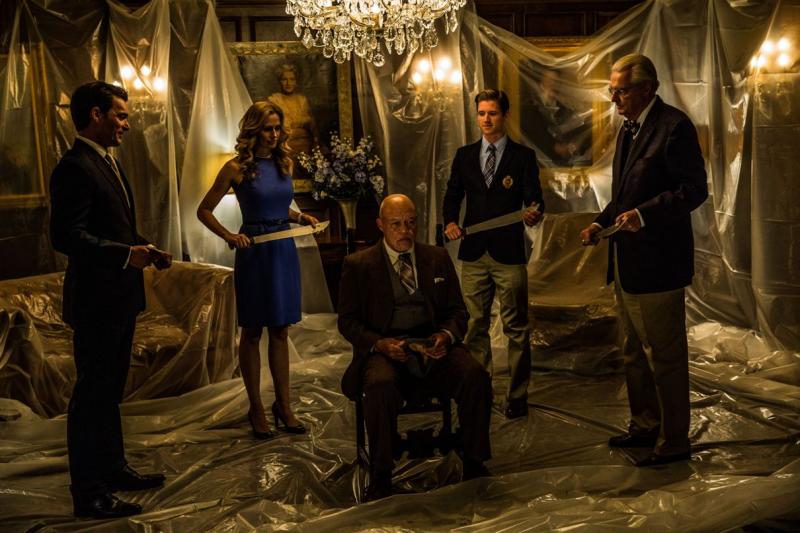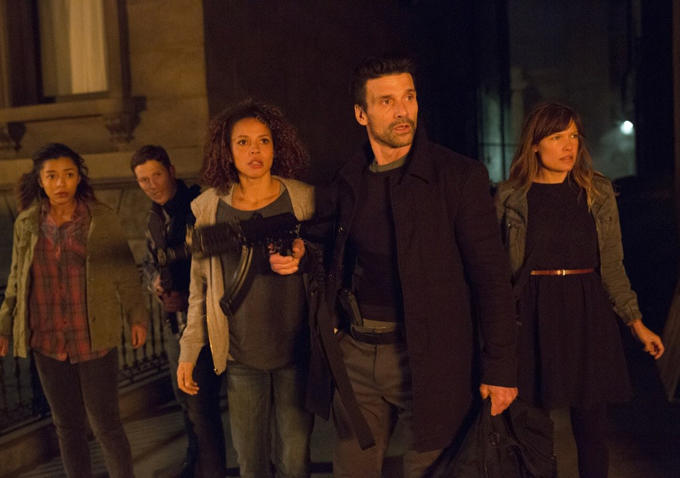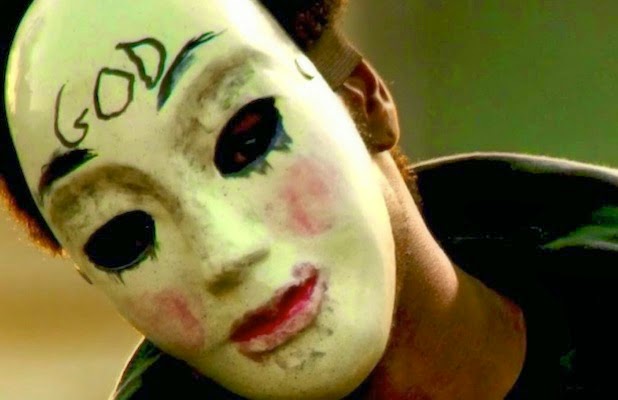The Purge: Anarchy | reviews, news & interviews
The Purge: Anarchy
The Purge: Anarchy
Sequel to thoughtful action-horror hit deepens the dystopia

The Purge is the night each year when the US government turns off the law and lets mayhem rule, allowing crimes including murder and rape. Just let it all out of your system, citizens, goes the official logic, and crime on the other 364 days will plummet.
Writer-director James DeMonaco’s concept in the original, box office-topping The Purge limited the action to a home invasion in the suburbs, and promised all sorts of illicit nastiness. But as this expansive sequel proves, he’s more interested in the social implications of the people becoming their own bread and circus. With the New Founding Fathers of America running this 10-years-hence USA much as you imagine the Tea Party would, the dystopia never seems far-fetched. In parts of present-day Chicago, where 80 were shot this 4th of July weekend, some purge all year already.
 The Purge: Anarchy’s hero is laconic soldier Leo (Frank Grillo, pictured second right), motoring through the chaos to do some purging of his own on the drunk-driver who killed his son. His inconveniently sputtering conscience leaves him weighed down by Eva (Carmen Ejogo) and her daughter Cali (Zoe Soul), and a bickering suburban couple (Zach Gilford and Kiele Sanchez). As they move through the city, they are hunted by secret government kill-trucks, roaming the streets to further cull a working class targeted by CCTV. The ruling class, meanwhile, are having proles picked off the streets to be purged inside their safe mansions. Leo’s combat skills solve many of these issues.
The Purge: Anarchy’s hero is laconic soldier Leo (Frank Grillo, pictured second right), motoring through the chaos to do some purging of his own on the drunk-driver who killed his son. His inconveniently sputtering conscience leaves him weighed down by Eva (Carmen Ejogo) and her daughter Cali (Zoe Soul), and a bickering suburban couple (Zach Gilford and Kiele Sanchez). As they move through the city, they are hunted by secret government kill-trucks, roaming the streets to further cull a working class targeted by CCTV. The ruling class, meanwhile, are having proles picked off the streets to be purged inside their safe mansions. Leo’s combat skills solve many of these issues.
DeMonaco scripted 2005’s Assault on Precinct 13 remake, and the original’s creator John Carpenter is his model here. The laconic anti-hero and his forward motion across hostile territory via streamlined action scenes, the resourceful Howard Hawks-style misfits he reluctantly leads, and Nathan Whitehead’s pulsing synth score carry echoes of Carpenter’s Assault on Precinct 13 and Escape from New York. The radical social satire which peaked with Carpenter's outrageous They Live is another gleefully seized genre baton.
 As a director, DeMonaco lacks his role model's shark-like relentlessness. But he knows low-budget horror and action cinema can even suggest violent revolution against the one percent, provided it's profitable. “Change only comes when their blood spills,” guerrilla leader Carmelo (Michael K. Williams) therefore observes, not unreasonably, as his rebels trade fire with the killer elite’s heavily armed servants. It’s like the Black Panthers assaulting a nakedly neo-fascist Downton Abbey. The bloody corpse of a stockbroker chained to a bank adds to the cautionary notes about where a society with a contemptuous ruling class, abandoned working-class and epidemic gun-crime may find itself. Being pulp fiction, the point is made with a smoking assault rifle.
As a director, DeMonaco lacks his role model's shark-like relentlessness. But he knows low-budget horror and action cinema can even suggest violent revolution against the one percent, provided it's profitable. “Change only comes when their blood spills,” guerrilla leader Carmelo (Michael K. Williams) therefore observes, not unreasonably, as his rebels trade fire with the killer elite’s heavily armed servants. It’s like the Black Panthers assaulting a nakedly neo-fascist Downton Abbey. The bloody corpse of a stockbroker chained to a bank adds to the cautionary notes about where a society with a contemptuous ruling class, abandoned working-class and epidemic gun-crime may find itself. Being pulp fiction, the point is made with a smoking assault rifle.
The other auteur of a sort here, producer Jason Blum, is notorious for a micro-budget production line also responsible for the Paranormal Activity, Insidious and Sinister franchises, and crate-loads of similar, wholly unreleased films. By giving DeMonaco his head, this Hollywood factory farmer briefly touches the hem of B-movie monarch Roger Corman, who encouraged subversive directors, so long as they remembered the sex and violence.
DeMonaco is a more interesting writer than director, and better at ideas than dialogue. A weird and jumpy scene where our heroes seek refuge with a middle-class family, though, shows his ambitious franchise’s potential.
The future of Arts Journalism
You can stop theartsdesk.com closing!
We urgently need financing to survive. Our fundraising drive has thus far raised £49,000 but we need to reach £100,000 or we will be forced to close. Please contribute here: https://gofund.me/c3f6033d
And if you can forward this information to anyone who might assist, we’d be grateful.

Subscribe to theartsdesk.com
Thank you for continuing to read our work on theartsdesk.com. For unlimited access to every article in its entirety, including our archive of more than 15,000 pieces, we're asking for £5 per month or £40 per year. We feel it's a very good deal, and hope you do too.
To take a subscription now simply click here.
And if you're looking for that extra gift for a friend or family member, why not treat them to a theartsdesk.com gift subscription?
more Film
 Can I get a Witness? review - time to die before you get old
Ann Marie Fleming directs Sandra Oh in dystopian fantasy that fails to ignite
Can I get a Witness? review - time to die before you get old
Ann Marie Fleming directs Sandra Oh in dystopian fantasy that fails to ignite
 Happyend review - the kids are never alright
In this futuristic blackboard jungle everything is a bit too manicured
Happyend review - the kids are never alright
In this futuristic blackboard jungle everything is a bit too manicured
 Robert Redford (1936-2025)
The star was more admired within the screen trade than by the critics
Robert Redford (1936-2025)
The star was more admired within the screen trade than by the critics
 Blu-ray: The Sons of Great Bear
DEFA's first 'Red Western': a revisionist take on colonial expansion
Blu-ray: The Sons of Great Bear
DEFA's first 'Red Western': a revisionist take on colonial expansion
 Spinal Tap II: The End Continues review - comedy rock band fails to revive past glories
Belated satirical sequel runs out of gas
Spinal Tap II: The End Continues review - comedy rock band fails to revive past glories
Belated satirical sequel runs out of gas
 Downton Abbey: The Grand Finale review - an attemptedly elegiac final chapter haunted by its past
Noel Coward is a welcome visitor to the insular world of the hit series
Downton Abbey: The Grand Finale review - an attemptedly elegiac final chapter haunted by its past
Noel Coward is a welcome visitor to the insular world of the hit series
 Islands review - sunshine noir serves an ace
Sam Riley is the holiday resort tennis pro in over his head
Islands review - sunshine noir serves an ace
Sam Riley is the holiday resort tennis pro in over his head
 theartsdesk Q&A: actor Sam Riley on playing a washed-up loner in the thriller 'Islands'
The actor discusses his love of self-destructive characters and the problem with fame
theartsdesk Q&A: actor Sam Riley on playing a washed-up loner in the thriller 'Islands'
The actor discusses his love of self-destructive characters and the problem with fame
 Honey Don’t! review - film noir in the bright sun
A Coen brother with a blood-simple gumshoe caper
Honey Don’t! review - film noir in the bright sun
A Coen brother with a blood-simple gumshoe caper
 The Courageous review - Ophélia Kolb excels as a single mother on the edge
Jasmin Gordon's directorial debut features strong performances but leaves too much unexplained
The Courageous review - Ophélia Kolb excels as a single mother on the edge
Jasmin Gordon's directorial debut features strong performances but leaves too much unexplained
 Blu-ray: The Graduate
Post #MeToo, can Mike Nichols' second feature still lay claim to Classic Film status?
Blu-ray: The Graduate
Post #MeToo, can Mike Nichols' second feature still lay claim to Classic Film status?

Add comment